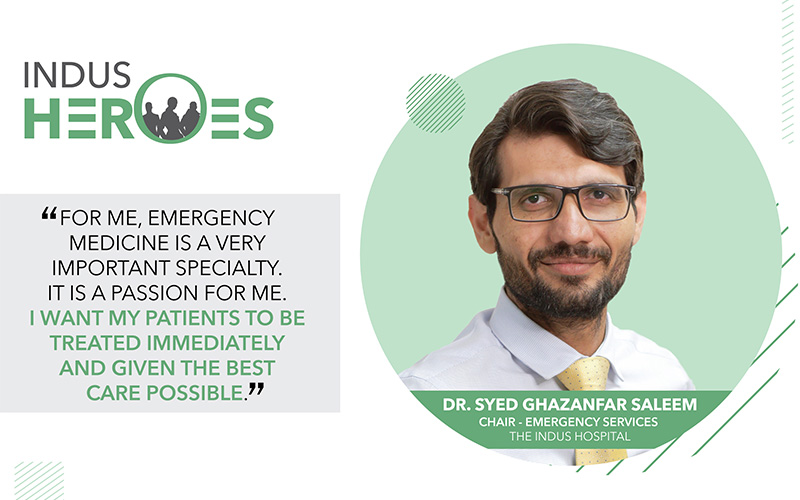
After Pakistan was hit with COVID-19, The Indus Hospital like other hospitals in the country was hit hard with the influx of patients pouring in. Despite the challenges, The Indus Hospital was at the forefront of the battle against the pandemic as it seeped through the country.
When one walked into the Emergency Department of The Indus Hospital, one section of the department resembled a war-zone with doctors running to and from between the patients in the dedicated section.
Dr. Syed Ghazanfar Saleem, Chair, Emergency Services at The Indus Hospital was often seen darting between beds as he and his team worked on a rotation basis to deal with the patients in the COVID-19 emergency ward.
A graduate of Karachi Medical and Dental College, Dr. Ghazanfar holds a Fellowship in Internal Medicine from College of Physicians and Surgeons Pakistan. He received his training in Internal Medicine from Abbasi Shaheed Hospital and did a course by Harvard Medical School — the International Emergency Department Leadership Institute (IEDLI).
Currently, he is pursuing a Masters in Health Professional Education from Jinnah Sindh Medical University.
He is also the recipient of Australasian College for Emergency Medicine (ACEM) international scholarship in 2019 and the country liaison for American College of Emergency Physicians.
Since 2014, he has been part of The Indus Hospital where apart from heading one of the most happening departments, he is also working on improving the state of emergency medicine with limited resources.
For Dr. Ghazanfar choosing emergency medicine was not a one-off decision. Multiple factors were there but it was a very personal reason why he decided to go into the field which had been around for less than 15 years in Pakistan as a specialty.
“I joined the emergency medicine field because of a personal experience. My mother was ill and had to be taken to the emergency department of a local hospital to be treated. It was below par treatment that she received that made me want to
join emergency medicine so I could work on improving it,” explains Dr. Ghazanfar.
After his fellowship, Dr. Ghazanfar joined the Emergency Medicine Department of The Indus Hospital.
“For me, Emergency Medicine is a very important specialty. It is a passion for me. For someone who is sort of an adrenalin junkie, someone who is constantly standing on one’s own toes, this is perfect. I want my patient to be treated immediately and given the best care possible.”
“My goal is to improve the state of emergency medicine in Pakistan and especially in Karachi and to take it to the next level. At Indus, I am working towards this goal slowly and gradually.”
Emergency care deals with nearly 50 percent of the care during a patient’s stay at a hospital. If a patient is looked after by an untrained doctor in the Emergency Room there are chances of them being harmed.
A fairly new field in Pakistan, there are only nine or 10 training sites in the entire country, with less than 100 trained emergency physicians. “We are trying our level best to improve the level of emergency physicians we train. There is a gap and we are trying to fill it,” adds Dr. Ghazanfar.
More than 550 to 700 patients walk through the door of the Emergency Department at the Korangi campus each day. In a 33-bed department, the influx of more than 700 patients daily is not an easy task. “Our waiting time is higher, there are treatment delays as well but we are still trying to improve our quality.”
“I joined Indus because it is a one-of-a-kind hospital, which does not compromise on the level of care being provided. The hospital is willing to go all the way when it comes to patient care. We here at Indus will never say no to any patient whether they can afford treatment or not because this is a completely free of cost hospital.”




